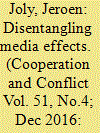| Srl | Item |
| 1 |
ID:
149492


|
|
|
|
|
| Summary/Abstract |
Whether and how media are able to influence policy and the political decision-making process is still the topic of much debate. However, if news media are indeed able to influence policy, they are commonly believed to do so indirectly through their agenda-setting function – by getting issues onto the political agenda after sudden peaks of attention. Yet, despite the assertion of agenda-setting theory that policy changes occur mainly through steady advocacy of policy alternatives, little attention has been paid to the long-term effects of media exposure. The analysis of emergency assistance in Belgium from 2000–2008 shows that short-term and long-term media attention to specific countries affect decision-making in quite different ways. This study reveals different ways in which media attention can impact policymaking, as short-term attention mainly determines which countries receive assistance, while long-term attention affects the amount of assistance granted.
|
|
|
|
|
|
|
|
|
|
|
|
|
|
|
|
| 2 |
ID:
079918


|
|
|
|
|
| Publication |
2007.
|
| Summary/Abstract |
The importance of hate radio pervades commentary on the Rwandan genocide, and Rwanda has become a paradigmatic case of media sparking extreme violence. However, there exists little social scientific analysis of radio's impact on the onset of genocide and the mobilization of genocide participants. Through an analysis of exposure, timing, and content as well as interviews with perpetrators, the article refutes the conventional wisdom that broadcasts from the notorious radio station RTLM were a primary determinant of genocide. Instead, the article finds evidence of conditional media e fects, which take on significance only when situated in a broader context of violence
|
|
|
|
|
|
|
|
|
|
|
|
|
|
|
|